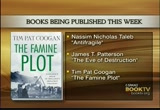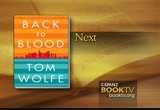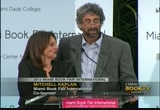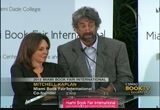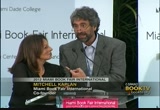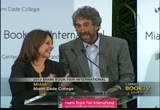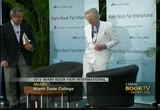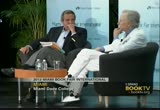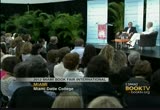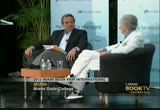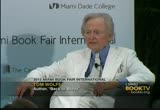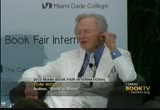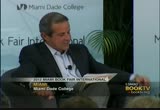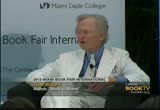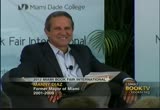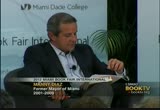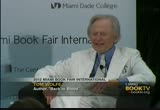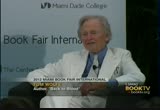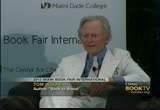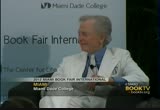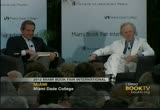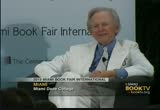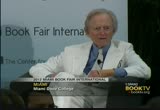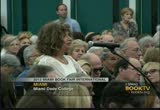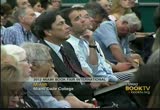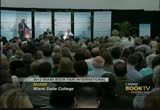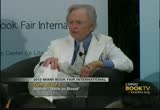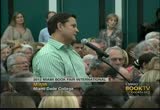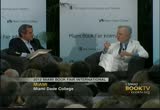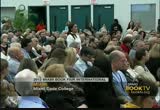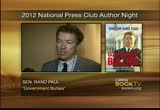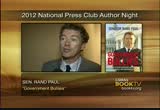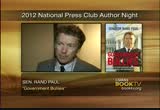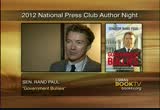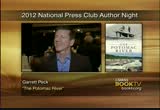tv Book TV CSPAN November 24, 2012 10:30am-11:30am EST
10:30 am
1965 transformed america. in the salmon plot, england's role in ireland's credit strategy historian tim had to then chronicles the irish famine and its lasting effect. elenore jones harvey, chief curator at the smithsonian american art museum presents a collection of photography about the civil war all along with text by famous authors of this time in the civil war and american art. in counting one's blessing:the selected letters of elizabeth, the queen mother, a selection of letters written by queen elizabeth i. ..
10:31 am
takes questions from the book their audience. [applause]ning, >> well, good evening to my everybody. >> hello, ev>>eryone. >> i am mitchell kaplan. i'm -- >>lcome. [applause] w welcehalf of all of us with the miami book fair, we want to youe welcome you to the 29th book not fair.applause] this is a remarkable undertaking. it takes the work of literally hundreds and hundreds of volunteers. we have a remarkable board of directors who work extremely hard at doing this year round.
10:32 am
none of this at all could happen without the good, good support of everyone here at miami-dade college, and let's give them a huge round of applause. [applause] >> and we're particularly appreciative of the sponsors. without the sponsors and the funding from foundations and governmental agencies, we would not be able to bring you all this wonderful literary extravaganza. >> and, of course, our friends. many of you are friends to have miami book fair. and a way that you can support this book fair and make sure that it goes on for another 29 years as well. [applause] if you, if you look at downstairs, there's a friends booth, and you're more than welcome to sign up if you'd like. i'd also like to tell you that make sure you pick up a fairgoers' guide on your way out. we have a remarkable program this year.
10:33 am
tomorrow night, in fact, we start not at night, but around 4:00 with lemony snick. for all of you who have got kids -- i see her -- he's coming with his new series, and he'll be here at four o'clock followed by junot diaz, wonderful writer, and chris hayes, many of you may know him from msnbc. and he'll be there ending the program that night. we also have an incredible program that happens in spanish and other languages as well. >> and we have some more than 70 writers from different countries , from latin america and spain that will be with us as well as the featured country this year, the country of pair guy. and we invite you to the opening of the pavilion next thursday, and we will have the first lady of the country doing the honors of opening the pavilion. so please come by, learn about their culture, traditions and their literature throughout the whole weekend. >> and if you'll welcome -- if you'll excuse on a personal note, i've been working with
10:34 am
alina very closely. alina's the executive director of the center here at the college. before that she was the executive director of the miami book fair for i won't tell you how many years. [laughter] it was a lot of years. >> a lot. >> and it's just been announced that alina is now the director of -- executive director of cultural affairs for the entire miami-dade college. we want to congratulate her on her new appointment as well. [applause] >> thank you, thank you. i'm looking forward to that. and part of my new responsibilities is to also work very closely with miami international film festival celebrating 30 years in march, and we have the director with us here this evening. so mark your calendars for that one as well. [applause] >> and my secret hope is that you'll see ballet with books in them, and you'll see opera with books in them. [laughter] so alina's influence will be everywhere, i think. >> and can i just take two more minutes of your time to see if
10:35 am
you can join me in we can nicing mitchell for 30 years of books and books. [applause] for his leadership, for his mission. [applause] >> thank you. thank you. wow. again, alina said that we couldn't do this without our sponsors. we also couldn't do it without our publishers who support us, and we're very, very fortunate to have in our midst one of the really most brilliant publishers that we have not only in this country, but probably worldwide. his name is michael peach, and he's the publisher of little brown who is tom wolfe's publisher. if he'll stand, i would hope he could be recognized. mike? there he is. thank you, michael. [applause] >> welcome. >> thank you.
10:36 am
and our sponsor, one of the really great sponsors that we've had for many, many years, they've been really huge supporters of the miami book fair, and that's wpbt, channel 2. and to get our program off the ground, i want to bring out the executive vice president and chief operating officer, delaware hour race sukdeo please, please, welcome her. thank you all. >> have a good evening. [applause] >> thank you, everyone, and welcome. my name is delores, i'm the coo for wpbt-2 which is your public television station. [applause] now, what i love about the miami book fair is that for me it represents how we should be known here in miami. sure, we have beautiful beaches, we've got some interesting politics. i think increasingly we'll be known for our wacky characters.
10:37 am
but if you look to the person to your right and if you speak to the person to your left, what you will find are engaged, informed, cultured citizens and in growing numbers. we are a smarter city than we give ourselves credit for, and we need to get comfortable with that idea. i hope it's because you've been watching more public television, i hope so. [applause] [laughter] but i am sure that there is no better way to take us to the next level than to hear from a literary icon. tom wolfe was born and raised in richmond, virginia, educated at washington university and later learned a ph.d. from yale. he spent his first ten years as a newspaper man mostly doing general assignment reporting, and i bet if i called on many of you, you could easily name his novels; "the right stuff," "in our time," "the bonfire of the
10:38 am
vanities" and many more, and now "back to blood" which reflects miami back to all of us. how are we going to react to that? he is credited with the birth of new journalism and the death of the american novel by some. he is the mark twain of our time. how lucky are we to have a moment in time with him? and what better way to start this conversation -- hopefully i can get them to come to the stage -- than with a published author in his own right and a man whose name is synonymous with leadership, our own former mayor, manny diaz. manny diaz, let me turn it to you. hopefully, we can get him up here, and tom wolfe. please welcome them. [applause]
10:39 am
>> well, good evening, everybody. and let's get this started. if "bonfire of the vanities," you chose new york with wall street and the upper east side as your setting. in "the man in full," you chose -- [inaudible] and then for "i am charlotte simms," you wrote about college sports at a fictional college. many believe it was duke, especially since your daughter attended duke, graduated from duke. my question is, and i think what all of us want to know, is why miami? how did you come to choose it as a backdrop, and what surprised you the most about miami? >> my first purpose was to write a book on immigration. this is when i was still working on my last book, and people would say what are you going to work on next? and i'd say, well, i'm going to do something on immigration.
10:40 am
and always the same response, oh, that's really interesting. and they -- [laughter] they'd go to sleep standing up like a horse, you know? [laughter] but i thought it was a really great subject. i wasn't interested in how people get in, but what they do once they're here because i didn't know. my first choice was the vietnamese in california who are there in huge numbers. they've now migrated from los angeles up towards san francisco, just like in miami in a way, there's -- the san jose mercury, a famous old newspaper is, there is now a viet-mercury. unfortunately, i couldn't speak vietnamese, and i couldn't read the paper either. i mean, just not even close. to ours. and then i heard about the following fact about miami: miami seems to be the only city in the whole world in which
10:41 am
people from another country with another language and a very different culture took over at the voting machine a big, metropolitan area in just over i would say, slightly over one generation. i'm talking about the cubans. we have a havana-born gentleman here to my right, and so i said i've just got to go, i've got to go see what this is all about. i knew so little -- i still thought that the great industry was tourism in miami. and then i found out that for some time it's been shipping, including shipping that made the miami federal reserve bank have more cash than all the rest of the federal reserve banks put together. but now it seems to be pretty
10:42 am
honest work. [laughter] and shipping. and i don't know if he's here tonight, an argentine journalist told me, he said miami is choice number two for everybody in latin america. only people in latin america can read the street names, that's one thing. but anyway, that -- and once i was here i knew so little, but i had a lot of friends including the mayor and chief of police john timiny. that's not a bad way to start. i say start at the top. [laughter] >> of course, when you were down here, we both told you that you had the mayor and the chief of police who had both immigrated to the united states in the same year, 1961, and both from an island, though an ocean apart.
10:43 am
>> you know, i didn't realize it was the same year. that was, john was born in dublin, and i don't know how many of you really remember john's -- you probably do -- his faith. he is the ultra irishman. and when you look at him, you know you're talking to a tough irishman. and one of his colleagues today today -- told me, he said john only had to draw his pistol twice, and those were shootouts. he said the rest of them he just looked at 'em. [laughter] anyway, that's how i got started, and what a great way to start. john immediately put me on a safe boat, which i'd never heard of before, of a miami marine patrol. it was like a foamy pancake but 25 feet long. and he goes 40 some miles an hour over water.
10:44 am
that's fast actually. and you can't sink them unless you shoot holes through them. nobody can turn them over. but anyway, they couldn't, they couldn't have helped me more. i had a slightly nice introduction from the mayor in the big hall at freedom tower, and that's the way to meet people, i think. >> let me ask you, also, racial and ethnic strife and tension not to mention class antagonismings seem to permeate your novels. do you purposely look for this and then choose a location, or does a location lead to the strife and the antagonisms? >> maybe i'm bragging now, but i think so few writers want to touch the subject of race, ethnicity and all those things. it makes people nervous as if
10:45 am
they're going to be run out of town or something. but i think that's america. that's what america is all about. and i never knew that i was born and raised in richmond, and there were only two types of people there, black and white. that was it. most of the whites were white anglo-saxon protestants. so when i went to get my first newspaper job in springfield, massachusetts, and people kept saying what are you, i didn't know what they were talking about. [laughter] and, but springfield was a city where people who couldn't get a job in boston, couldn't get a job in new york would come to springfield, a city of about 170,000. and everybody was either irish, italian or they were french- canadian. and it was important to them to know where you came from. i said, well, i came from
10:46 am
senegal valley. what? [laughter] but that was an education, just being in springfield. and this country is, it's about the, it is the great meeting place of people from all over the world. and somehow they get here, and they're free. it's -- and once, well, it's a fantastic accomplishment. i started to say america's a wonderful country, but it's -- [inaudible] >> there are some, of course, they probably don't know what they're talking about, but there are some that criticize some of your books that some of the characters are one-dimensional or simplistic or play to stereotypes. >> i think that with pride. so would dickens. [laughter] try to find some complicateed side of the great lawyer in --
10:47 am
[inaudible] i'll send you a postcard, the name are come to me. the name will come to me. i brushed -- i brush that off. >> good. what about the main character in "back to blood," even "the new york times" critic had to admit he was a real character. there are moral choices that your characters make that distinguish them from those around them. what do you feel that nester had in common with some of your other protagonists, and more specifically, what did his morality or choices have in common? >> i didn't mean to write about, when i started out, i didn't mean to write about a cuban boy. i do things a little bit better. there's a subject that interests me, a locale that interests me, and i walk b in, and i wait for the characters to arrive.
10:48 am
which they inevitably do. and probably because i got a great introduction to the police but not only john, but angel, one of the great figures in the police force here in my humble opinion. and they would steer me in this direction, and it was always, it was always the right, it was always the right direction. just be endlessly grateful. john couldn't be here tonight, he's in bahrain running the -- i'm not sure what he runs, but it's heavy stuff. [laughter] >> and, and, by the way, thank you for angel, for mentioning angel, dedicating the book -- >> well, let me just say angel had the greatest voice and temperament that i've ever seen. angel was -- well, let me put it -- angel was used for talking
10:49 am
hostages out of jumping off of buildings. when there's some crisis that comes to miami, they wouldn't put the chief on television, they'd put angel, because he had this voice that could calm everybody down. and he was also, he had been a very brave undercover policeman. but that, it's that voice that i remember. and it was never put on. it was never put on. he had great charm, but it was just himself. and i was just so shocked when angel died a couple of years ago. anyway, a great man. >> he was. tom, what was it about hialeah that made you zero in on it? [laughter] the way you did? how were you correctly, i think, able to zero in on the fact that that is a pretty important aspect of understanding the
10:50 am
neutrality of cuban culture in miami? >> well, i arrived here thinking it was a race track still. it is still there, but they had things like quarter horse races and this and that. because it was the greatest track just to look at in america. there were flamingos in the infield, and the way they kept -- and not in a cage. the way they kept it, they planted these shrubs around the infield that they require in order to keep their pink color. if they don't have this to eat, they turn white, and they feel terrible. anyway, it was a gorgeous place. but then when i got here thanks to oscar corral and his mother-in-law and some others i found out that the real little havana in latvia is hialeah. but it's not very little
10:51 am
anymore. about 225,000 people. and that was the population of miami within the city limits. >> within miami proper? just over 400,000. >> i thought little havana was around -- [inaudible] and if you wield a cup of cuban coffee, you watch the old men play checkers across the street, you'd been there. [laughter] >> well, speaking of oscar, you have a incredible reputation for the amount of research that you do when you're writing a book. how do you compare the research you did for "charlotte simmons" or "man in full" to the research you did in miami for "blood," and i don't think you've ever done this before, so what was it like having a camera following you around during your research? i know that when i was in office, oscar corral followed me around all the time, and i didn't particularly like it,
10:52 am
so -- [laughter] >> you'll see for yourself what happened to me when oscar followed me around. he's on after we arement the one thing i couldn't do was let any cameraman in on private interviews. >> right. >> there's nothing to put a conversation to a halt faster than a tv cram. camera. other than that, and my posture wasn't very good. that's the first thing i noticed. [laughter] anyway, i think he did a brilliant job. >> a few years back you came to miami at my invitation, spoke about art and its contribution to the city of life. in your books art, especially high-end art, play an important part in setting the scenes, especially art hanging in some rich guy's apartment in manhattan. and, of course, you use the new art movement in miami as part of the backdrop in "back to blood."
10:53 am
could you take a minute to talk about art and what it means to cities in america today? >> art is, it used to be totally underestimated. now it's a driving force. artists are the best roles they adopt is in america. i mean, i see this in new york all the time. they move to some god forsaken neighborhood in the worst part of brooklyn, the next thing you know the rich can't wait. [laughter] to pour in and buy, and buy territory. as a matter of fact, look at the success of winwood. that's the artists as real estate development. sometimes they don't treat them nicely. in providence, rhode island, where you may know the name buddy chauncey was mayor, buddy was a multifaceted figure -- [laughter] but he got the bright idea of,
10:54 am
he talked to real estate people who had a lot of just kind of dead property, warehouse and so on in the middle of providence to let artists use these lofts for really token, you know, $50 a month, that kind of thing. and it was the smartest thing he ever did. well, different definitions of smart. he suddenly found corporations were moving in because the artists were all in this particular area. the civic improvements were happening. they used to -- the rivers there in connecticut used to be covered in the pavement for more parking space. there's the river underneath. he had all the parking, asphalt taken away, and each week he had
10:55 am
a boat come down the river with sort of spraying incense and music was playing on the boat, and people would gather around that river and chock a block. now, that's the power, that's the power of art. and it doesn't matter what the artists are like. just as long as they are, just as long as they are artists. on the spiritual side, i don't really know. [laughter] because i'm baffled here. every well-to-do art collector has an aa and an art assistant who chooses for him or her what he or she likes.
10:56 am
oh, i didn't know i liked that. [laughter] but it's, it just works. it's a form of religion. i really believe that. in which you don't have to, you don't have any morality, you just have places to go to worship. [laughter] >> by the way, we're going to -- i'm going to ask one more question, and then we're going to open it up to all of you who i'm sure have lots of questions for tom. finally, tom, after "bonfire of the vanities" you got into a few tiffs with other authors about what real writing is. you guys were particularly nastiest with mailer, updike and irving, referring to that -- if i remember correctly -- as the three stooges. were you just trying to start a fight just to be provocative? there seemed to be a choosing up of sides, and many along the 43rd street corridor at the time new york magazine often cited
10:57 am
the scene with mailer and company. do you think this fight has had a negative impact on reviewers of your book? in other words, do you think they use each new book as a chance to get even? >> in a word, yes. [laughter] i couldn't resist. everyone always said never answer a review, it's crazy, it shows you've been hurt, you're sensitive. but i had three of them, and they were all old men. and old men who are successful in anything, they don't sit around writing reviews. but these guys did. john updike, who was so old in public print he'd complain of his bladder problems. [laughter] norman mailer who had two rusted-out hips, and he was going around on crutches. and john -- i kind of made fun of john irving. he was pushing 60, which really isn't all that old. [laughter]
10:58 am
and there were three of them, so i had the perfect title, my three stooges. [laughter] and i said a stooge -- this is literally true -- a stooge on stage is someone who sets up the lines for the comedian. and i said, this is all they've done, they set up lines for the comedian. but a lot of people never forgave that. the piece is called "my three stooges." the author happened to think it was brilliantly funny, but many people thought i'd still made a terrible gaffe by saying what i really meant. this is not true of many, but, you know -- of manny, but, you know, a gaffe to a politician is when a politician says what he really means. [laughter] and that's what's considered. he should have known better than that. and the reason i have a kind of long distance love of biden, joseph biden, is that there was
10:59 am
a big outbreak of some disease in mexico, very contagious. i can't remember the exact disease. and he was asked by a reporter would you -- he had a daughter who sometimes went to mexico. would you advise your daughter to go to mexico tomorrow? he said, hell, no. she'll catch -- oh, the denunciation of him telling the super truth were unbelievable. so you have to honor the politicians that commit a lot of gaffes, i think. oh, by the way, i shouldn't -- officially this is a program that's about "back to blood," but it really has to do with manny diaz. on friday will be the publication, the launch of "miami transformed." and i haven't read it. >> you're in it though. you're in it.
11:00 am
>> i'm in it? >> you're in it. you're absolutely in it. >> why didn't you give me an advance copy? >> when tom came down, there was a big dispute between chief timiny and tom as to what really transformed cities, and, of course, tom was talking about art, but the chief, of course, was all about security, the police department and safe neighborhoods that transform cities. so that's the way he's in there. >> well, you know john better than i do, but i couldn't agree with you more. >> are you going to help me out with some questions? thank you for holding back on that last one. >> let's thank these two gentlemen here. [applause] we do have time for some questions, and i would really hope that they'll be questions. that would be unique for the miami book fair. [laughter] but we'd love them to be questions. and if you can line up behind this gentleman, we'll get to as many as we can. yes. >> a book or two ago you wrote a
11:01 am
description of hip-hop music that was so on the money that i thought to myself, tom wolfe really gets hip-hop music, and tom wolfe really likes hip-hop music. two questions. do you like hip-hop music and, second, as a writer do you do anything special to really get inside the brain of something that's so foreign to you? or have you been doing that for so long that it's just second nature? >> well, in answer to your first question, no, i don't like hip-hop. [laughter] >> thank you. >> but i do like country and western. [laughter] and one of my favorite titles is "that ain't my truck in her driveway." [laughter] that says so much about the -- there's not going to be any saab or lexus or toyota in that girl's driveway. isn't that great? it's just wonderful. that ain't my truck in her
11:02 am
driveway. that's why i like western. oh, god shift me through the goalpost of life. that's another one. i won't go on. and railroad music. [laughter] ♪ on the wabash cannonball. all the railroad songs are good, not a bad railroad song. i've never had a chance to say this before. [laughter] >> mr. wolfe, i remember the last time you were here. actually, someone in the audience asked why don't you write about miami, and you said, no, carl -- [inaudible] has already done a good enough job for that. i'm not holding you up to it, i really enjoyed your book, but did you feel any pressure having read other authors from miami to do something different, or were you inspired by them? i'm just curious about your process on that. >> well, carl is in a league by himself. i've read everything -- i think -- every word that he's ever written. he's brilliant in the sociological sense without
11:03 am
making it seem sociological. and the, he writes the thrillers, but instead of finding a body on page 3, you find a guy who falls down in a strip club. [laughter] and you go on from there. he's absolutely, he's absolutely brilliant. i wouldn't even think of topping carl. i don't read many people who, i think, have done miami justice because they don't really look around. a lot -- they want to write about south beach. and there are certainly things to be written about south beach, but there are other parts of miami. and they cannot -- they tend not to write about it. of course, i haven't read everything. maybe they have, but i haven't seen it. >> yes, the next one. >> hi, mr. wolfe.
11:04 am
sex plays such a big role in your books, and a lot of your characters are really driven by it. i remember when i saw you in new york maybe five years ago, you told the audience that sex was god's little joke. what did you mean by that? >> wait a minute, say that again? [laughter] >> i saw you in new york about five years ago. you were reading and also a latin jazz ensemble was playing. it was at barnes & noble near nyu. and near the end you looked at the audience, and you said sex is god's little joke. what did you mean by that? >> sex is the -- >> [inaudible] >> i still believe that. [laughter] just read the papers today and yesterday. [laughter] and you'll understand. i mean, you know, you can -- you have all these ambitions. particularly it was true you can have all of these ambitions, be you can't get rid of that urge.
11:05 am
[laughter] and it's going to, it's going to torment you. it's god's little joke because god says you can do whatever you want, you're going to procreate, and we're going to have more of your kind whether you want it or not. that's why i'm very curious about what's going to happen with a country so full of unwed mothers. it's a tough thing to pull off, and it's very hard to be ceo of a bank as a -- oh, and also be a mother, a good mother. >> thank you. >> thank you. >> so -- >> god's little joke, sometimes it isn't funny though. [laughter] >> hi, it's good to be here, and
11:06 am
i'm an immigrant from the bronx, new york. [laughter] and i was just wondering were you able to get by with or without spanish? as a emigre, i find it very difficult not to get along well without spanish. also, how is your salsa dancing? >> [inaudible] >> how is your salsa dancing? >> oh, i'm great at the tango. >> no, no, no, that's argentinean. it has nothing to do with the cuban culture. yeah. >> the salsa's kind of beyond me. >> but the spanish, i'm interested in how you got along with or without the spanish. are you fluent? did you get fluent? did you have an interpreter with you? what did you -- how did you amass your ability to transform this town into english that is primarily a spanish --
11:07 am
>> well, i learned only about 45 minutes ago that i made a mistake, a glaring mistake. i was pointing out that because "the miami herald" years ago when a massive immigration was coming in of some cubans and latin americans generally, the herald was, broadly speaking, against it. and that are a lot of, i think, latins who resented the stand that they were taking. so it came to be called i thought it's the -- [speaking spanish] >> it is. >> now, i was just informed that that's really not correct spanish. that it should be -- i'm just asking your opinion -- no yo creo a la herald.
11:08 am
which would you use if you used it? >> you know, i don't really know. i'm not -- [laughter] and i think that by this town not becoming a bilingual town, i mean, it has over the years children that are being taught in the public school, but there's still not a blanket statement that this is a bilingual town, and i think that's the flavor that's missing. that our african-american children, that our caucasian children are not being brought up to speak both spanish and english. and i just want to be a stand for that, that that's what needs to happen here. [applause] >> thank you. >> yeah. >> hello. um, i'm referring to -- >> please speak into the mic. you can pull it down. >> speak into the mic. >> thank you. >> i will. how's that? >> good. >> okay. i'm referring to "charlotte simmons," and i'm wondering if
11:09 am
you transgendered into "charlotte simmons," if you think this is any hope for young college women -- i'm a college teacher -- and i'm wondering if you think there's hope for college women these days? >> you mean in general terms? when i wrote "i am charlotte simmons," i went to many different colleges, and it was not meant to be duke. [laughter] but my daughter was at duke, and i'd named it dupont, sort of close to duke. and i had gotten the architecture like duke, but honestly, it was supposed to be entirely fictional. anyway, the saying among undergraduates at that time -- except at duke -- was if she doesn't come across on the fourth date, that's it. today it's a little different. if she doesn't come across by
11:10 am
the second date. and i was talking to one student, i was bringing this up recently, and he said what's this about dates? [laughter] and maybe that's it. but now this was a theory that i think is worth paying attention to. i think it was oscar corral's theory. tell me if i'm right, oscar. the ubiquity, the use everywhere of cell phones which also a take pictures just as ipads take pictures has gotten down some of the wildness at colleges. everybody loves to take out their camera. you're doing something absolutely insane. and this haunts people. the film is developed, and somehow it gets in the wrong
11:11 am
hands, it gets on youtube. youtube loves these wild college parties. and it's making people much more careful. i like this theory. i can't, i can't really say whether it's true or not, but wouldn't that be interesting if there were a good effect of information technology? [laughter] >> let's take three more questions. the three people who are in line. >> mr. wolfe, um, i'm a native miamian, and thanks to you about 20 years ago there were three gentlemen running across i-95, um, asking if they could help my husband and i. and i knew what was going down having read "bonfire of the vanities." they weren't coming to help me at all.
11:12 am
[laughter] and we were robbed at gunpoint. but i've since lived here for a long time and raised three children, and it's a wonderful city. i love miami, and i just wondered after you having done your research and meeting all these interesting characters that we clearly have no shortage of here, if it's the kind of place that you think you could live. >> well, i think there's no blanket statement that i think i could make because there's such variety in miami. i don't know these statistics for single mothers and things like that, you probably do, but it's, it's such a complicated, it's really such a complicated subject. but it wouldn't hurt people to cut down a little bit, seems to me. >> do you think you could live here? do you think you could -- >> oh, sure. i've been looking at -- the
11:13 am
prices have been going up in the price. i was told you could come to miami and you could get a four or five-bedroom apartment down near the ocean for, you know, $400,000. [laughter] which a lot of people can swing. but it's reverse. the real estate decline hit miami long before the recession of 1987. but i hear you can't get those great bargains. >> no, you can't. thank you. >> anymore. >> two more questions. two more questions. just the two people that are left. i'm sorry. >> mr. wolfe, at the beginning of the "bonfire of the vanities," a mayor is told by a mop "back to blood," and i notice now from the title of
11:14 am
your book, aside from the great phrase, is there any symbolism to the fact that you -- >> tell me that phrase again? >> "back to blood." >> oh, back to -- [laughter] you've got it. i felt i had to explain in the prologue to the book this was not wet blood. although if there are any horror fans who would like that, they could interpret it any way they want. but it was bloodlines. and i do honestly believe in the age in which religion is fading particularly among educated people -- speaking of gas, some quote is it's kind of a gaffe to admit that you're religious. any university today, not any university, but many, many. you could be in the english department and you say you don't believe in the theory of evolution, they'll find a way to get you out.
11:15 am
it's unfortunately true. and i think in an age like that people are going -- everybody wants to be able to believe in my theory, believe in something absolutely. everybody wants to believe that their own beliefs are chiseled in stone if not by god, then by darwin. and i think it's naturally, it's quite natural to retreat to your, your own people. and matter of fact, after 9/11 in new york this is how you have two kinds of allegiances. the reverend jerry falwell and pat robertson both announced that the 9/11 was the result of
11:16 am
homosexuality in america. and which was pretty farfetched. but i said, wait a minute, they're both from virginia! jerry falwell's from lynchburg, i went to the same college, what are they doing? what do you think they're doing? and that's "back to blood." they're both virginians, and you can't go around in front of me talking about virginians in that, in that manner. so i think often we have two sets of beliefs. if you want to hear more of this theory thing, ity -- i think that everybody identifies themselves with a status group which if its beliefs were carved in stone, would make the group -- not yourself -- the
11:17 am
group the most important in the world. i mean, i've been, i was in a country store during the second world war, and here were these three old, good old boys from north carolina just talking, and one of them says, you know -- they were talking about the war, second world war -- he says it all seems to lead back to this guy hitler. [laughter] he said instead of saying -- sending all these boats with supplies over to europe, why don't we just go shoot him? and another of the good old boys says, well, you know, i don't think -- i'm sure it's not that simple. you can't just go over there and shoot him. i said, i'll shoot him, you just get me a boat. just get me over there. [laughter] so even then it's probably, it may not be as easy to do. he says, i'll tell you what i'll do, our government never thought of this. i'll walk to the front door,
11:18 am
ring the bell, and when he comes to the door, i'll shoot him. [laughter] and another of the good old buys said i'm sure it's not that simple. he's probably got a wall around the stuff. you can't just go barging in. okay, here's what i'm going to do. i'm going to hide my rifle underneath a raincoat, and i'm going to go around to the back of the place, and when it gets dark, i'm going to climb over and hide behind a tree. and in the morning when he comes out to pee, i'll shoot him. [laughter] .. you cannot count on the government to do anything for you. you can even count on it to defend you. you have to do a lot of things herself, and that is the basis of the belief and the sacredness
11:19 am
of the ownership. it is in the constitution.e, sho they want to be able to go there and should the dollar if theyhik government does not do it. and i think the government doesy always. and and they are perfectly comfortable being in that rural status. but if he had walked in with thd suit instead of big overalls,ib there would be hell to pay because you also believe in a certain. [indiscernible] i've to wear. i have discovered that i am kine ofhi behind the times. a, i turn up the places with a necktie. but thanks change. believe me.every man
11:20 am
every man and every woman thinks about a lot, a lot. maybe just to stay in alignment with your status group. tryng you're not trying to up does tri anybody.ay you're trying check stay where you are. and if anyway, i think status. >> thank you.>> by y, our last question. more >> i here there are a lot more people carolina. [laughter] >> i would not be surprised because north carolina, every year, brings in so-called guest workers to pick the cotton. picking cotton is about the worst job in the world. it's always at the height of the heat of the summer, and those
11:21 am
little bowls dried up to sharp points. it's extremely unpleasant. you cannot find innative born north carolina with any description who will pick cotton so they bring in guest workers. they are all from latin america, and they do -- they do all of the hard, all of the hard work, and most, they are happy enough to get it. >> let's go to the last question. >> i'm from colombia, live here for 20 years, and, actually, i got the idea to interview all my friends that came from different countries for a book which gladly you wrote about all the immigrants coming to miami. my question for you is if that book will be published?
11:22 am
you have such a unique way to see it. [inaudible] >> it will be published in spanish. the hold up is translation. >> yeah. >> if i finished the book on time -- [laughter] like, six months ago, there wouldn't be this hold up. [laughter] all of my books have. printed in spanish, and i've -- i've always been able to do pretty well reading -- >> right. this particular one sold, special for us because you write about our past and the impact in the city. thank you so much. >> oh, you're certainly welcome. [applause] >> yes. "zeroth seen book tv on c-span2,
11:23 am
48 hours of nonfiction authors and books every weekend . >> now joining us again, senator rand paul, his second book, government bullies. senator, who are the boys? >> welcome all throughout your government. forty-one different agencies to carry firearms alan the government. well, i don't mind the police or the fbi. well, the department of agriculture has a s.w.a.t. team. the fish and wildlife says what seemed. the fish and wildlife rated gibson guitar with guns drawn , to call their computer equipment and would and then did not let them know what they were accused of for years. when they finally accused of something it was breaking of foreign regulation, a law in india they were accused of breaking and penalized and the u.s. for breaking a law in india does the kind of stories we write about. >> how come we haven't heard
11:24 am
about that before? >> some of them you have. one of them is the case of a couple selling bunnies in a little town in missouri. there were fined $90,000 for having the wrong permit. the government said, hey, you can pay on our website, $90,000. if you don't take in 30 days 00s over $3 million. this is the kind of stuff that your government is doing to bully people demand we, frankly, think it needs to stop. they did the same with compass getting people's land insane, you can build on it because it's a wet land even though there is no water or stream or pond on the land. >> as a senator what can you do to change policy? >> we have looked as some of these things, and we know constructive legislation to try to fix them. like on the wetlands we save, the clean water act says you cannot discharge pollutants into navigable waters. i don't have any problem with that, but your backyard is not
11:25 am
inevitable water, and there is not a pollutant. so we try to redefine the clean water act to make sure we are not putting people in prison for putting clean dirt in their backyard, and that is what has been happening. a woman in southern mississippi got 84 months in federal prison without parole for putting clean dirt on her own land. >> senator, when you talk to your colleagues about these incidents, what do you hear? >> some are horrified. about eight of them who signed on and co-sponsored by bill to try to fix it. the other 92, and not sure what they're thinking about, but when you tell the american people how the government is harassing, of using, and even imprisoning people for selling raw milk, you can go to an amish farmer from some of these hamas farmers have been arrested and threatened with jail because they are selling milk to their neighbors. >> will you be taking these issues nationwide? >> we will be talking about it
11:26 am
everywhere anybody will listen because we think government has gotten out of control. government has run amok, and government has become a bully. someone has to stand up to a bully. >> november 2012, post-election. the 2012 elections clarify for you? >> well, that we as republicans need to do something to grow as a party. we are in danger of becoming a dinosaur if we don't figure out what people want out on the west coast, new england, around the great lakes. solid blue. and so we figure out what people want we're not the right to win again as a party. >> what do you think they want. >> i think they are conservative. they think we should balance our budget, but i also think they don't think we should be at war everywhere all the time. the one little more tolerance in policy as far as putting people in prison for possession of marijuana. think it would like to see more local judges take care of that, less prison time. i'm not in favor of encouraging people to use marijuana, but i
11:27 am
also don't think we should be putting people in jail for another. >> this is your second book. redid along former interview on your first book. you can watch that at booktv.org. the premise of that first book. >> the first book was the tea party goes to washington. about the tea party movement. i think it was an extraordinary movement, wrote to the biggest movement to happen in politics and our country in 40 years. a lot of people showing up. hundreds of thousands of people showed up at rallies, and it transformed the way we think about things in the sense that people began to question whether or not the law that was passed by washington, obamacare is one big example, but the laws are constitutional. the constitution gave the government the power to do certain things. this did not come up since the 1930's. >> again, november 2012 elections. >> that no one to talk about 2012. i'm tired 2012. let's talk about the future.
11:28 am
2012 was a very good for us. we are going to have to figure out a way to appeal to a bigger electorate. >> a year running for president? >> that is classified. dear clarence is not high enough to hear that. i want to be part of the national debate, but i think it's too early to make that decision. >> government bullies, second book by senator rand paul, everyday americans are being harassed, abused, and imprisoned by the feds. >> visit booktv.org to watch any of the programs you see here online. check the author or book title in the search bar on the upper left side of the page and click search. you can also share anything you see easily by clicking share on the upper left side of the page and selecting the format. book tv streams live on line for 48 hours every weekend. booktv.org. >> you may recognize geared from a former bookkeeper it on
11:29 am
probation. he is back at local history with a new book on the potomac river, a history and died. where does the potomac river start and end? >> at the fairfax hunt, near west virginia. a tiny little trickle it comes out of the side of the mountain. it ends at ford look out. pretty wide. and in between their is a huge amount of history. hundreds of historic sites. essentially where our nation grew up. it has the nation's capital along it. so we think about washington d.c., the national monument, the white house. the potomac river. >> well, people think about washington d.c., they think about the white house, the national monument, and the potomac river. >> that's kind of one of the things i was trying to push toward, especially for people who live in the washington area. the potomac is simply seen as an obstac
147 Views
IN COLLECTIONS
CSPAN2 Television Archive
Television Archive  Television Archive News Search Service
Television Archive News Search Service 
Uploaded by TV Archive on

 Live Music Archive
Live Music Archive Librivox Free Audio
Librivox Free Audio Metropolitan Museum
Metropolitan Museum Cleveland Museum of Art
Cleveland Museum of Art Internet Arcade
Internet Arcade Console Living Room
Console Living Room Books to Borrow
Books to Borrow Open Library
Open Library TV News
TV News Understanding 9/11
Understanding 9/11